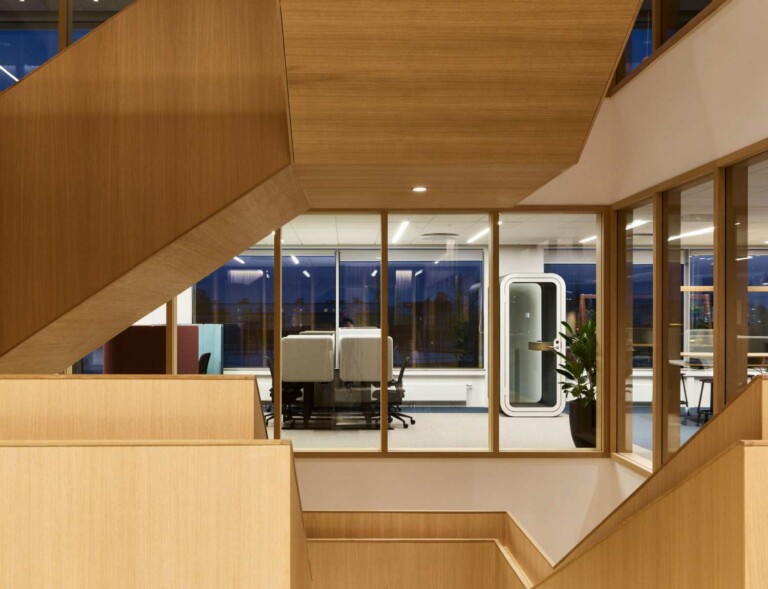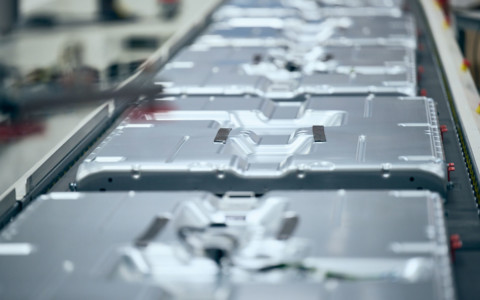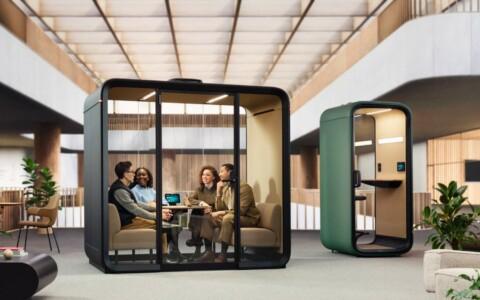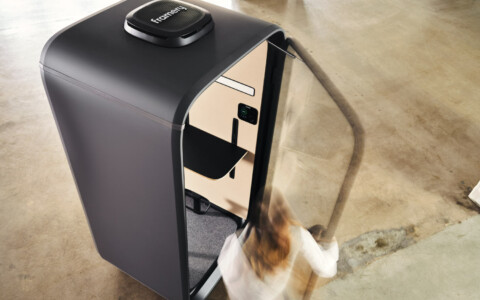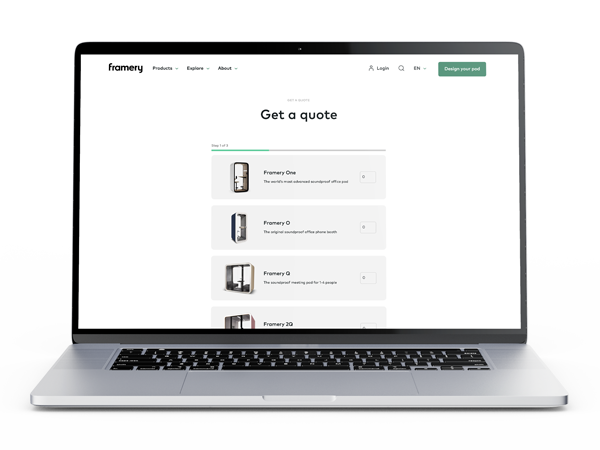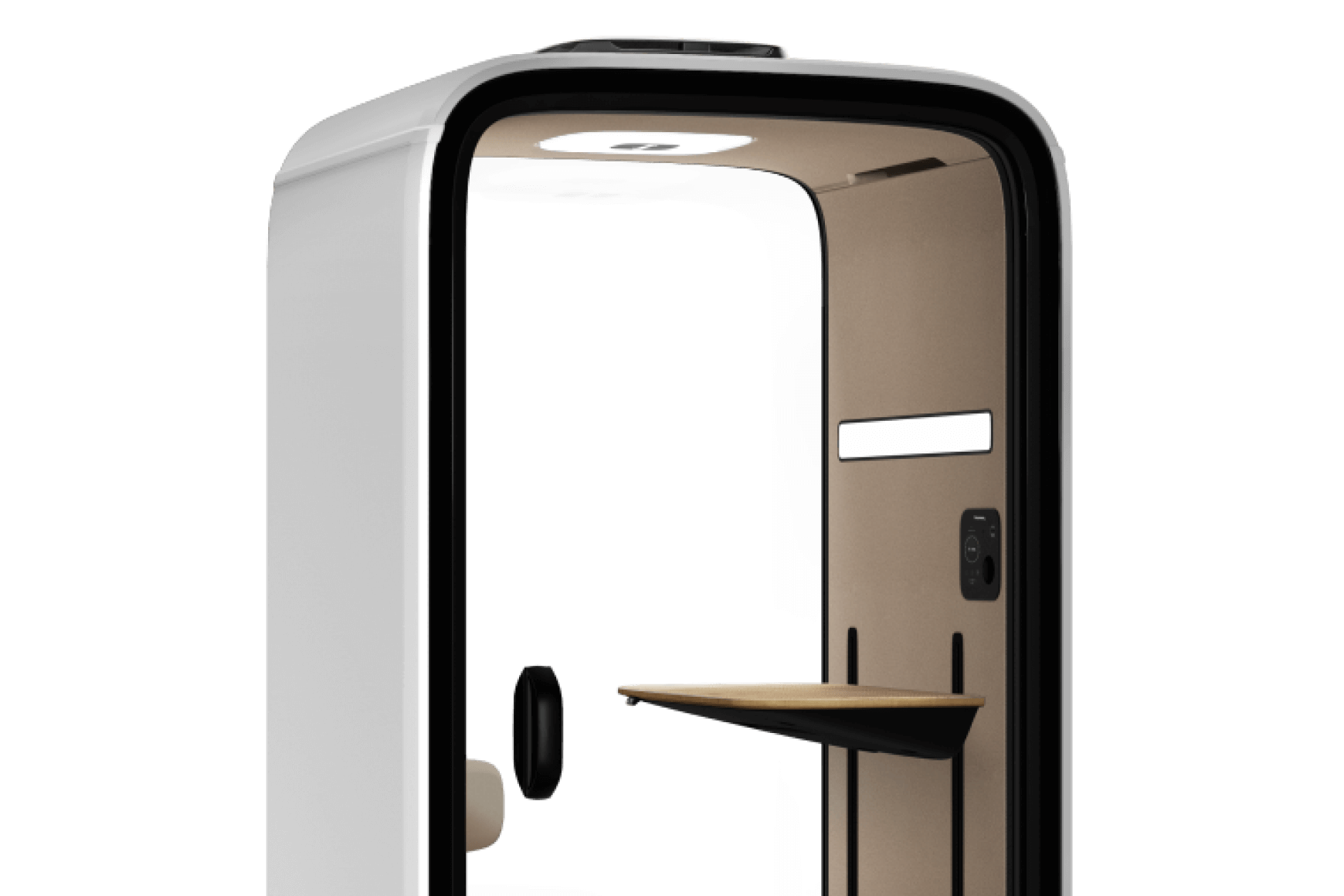Sustainability is one of the main concerns for many employees both in their personal and professional life. That is why many of them are demanding their workplace and office environment to adopt sustainable practices as part of everyday work. Employees are not happy with empty promises and vague statements about their employer’s commitment to sustainability but want direct actions instead. By utilizing smart and sustainable practices at the office, companies can support the well-being of their people and the environment.
How to create a sustainable office environment?
Although sustainability means so much more than just the environmental aspects, the well-being of the entire planet is at the top of most people’s minds. Creating an environmentally sustainable office requires decreasing the environmental impact of everyday operations, for example in terms of energy consumption, use of recycled materials, and many other regular practices. All of this includes not just what people do at the workplace, but the office building and its premises as a whole.
In order to improve the sustainability of office buildings, companies can also make sure to locate their offices in buildings that are eligible for sustainability certifications, such as LEED and BREEAM.
Things influencing the environmental impact of offices and office work include:
- Space efficiency. Reducing the office area is a straightforward measure to improve the environmental impact of the office building itself. Framery pods are a space-efficient solution for expanding the office with additional meeting rooms which would otherwise require more square meters. The pods can also be moved and relocated flexibly. To account for the changing needs of the office, its layout can be adjusted easily without setting up new walls.
- Energy efficiency. Electricity eats up a significant portion of the energy used in an office. A great deal of the electricity used at the office goes towards lighting, in addition to heating and cooling. Switch to more energy-efficient alternatives when upgrading and buying new electrical office equipment, such as computer monitors. Consider also switching to renewable energy if possible to ensure that only environmentally friendly methods of energy production are used to create the electricity. Framery pods are equipped with motion sensors that help reduce the use of electricity when the pods are not in use.
- Lighting. Energy-efficient lighting is another thing to consider when designing an environmentally friendly and sustainable office. In addition to switching from incandescent lights to LED lighting, using adjustable lights that can be made dimmer if needed, is one way to cut on the electricity bill. The lighting of Framery office pods and booths, such as the Framery Six, can be adjusted easily with the pods’ touchpad.
- Materials and office equipment. As most office workers have become aware by now, single-use plastic products are not a sustainable option, especially when there are better alternatives available. Even small changes matter. For instance, the office kitchen can switch from using plastic cutlery to recyclable ones made from wood. Better still, swap all single-use cutlery for reusable alternatives to minimize unnecessary waste. Printing and paper produce plenty of recyclable waste as well. Make sure to always recycle all paper and, if possible, opt for sending and storing documents digitally.
- Recycling. Many office workers are used to recycling everything they can in their everyday lives. However, they may become frustrated if their workplace does not enable them to recycle at the office. Help employees recycle paper, plastic, biodegradable waste, and other materials to prevent recyclable materials from ending up in mixed waste.
- Commuting and remote work. Remote and hybrid work has made traveling between the home and office unnecessary every day. The same applies to long business trips, especially ones done overseas. If possible, use video conferencing technology and hybrid meetings to reduce emissions caused by commuting and air travel. Not only is this better for the environment due to fewer emissions, but it also helps to cut costs on travel expenses. Framery office pods are the ideal solution for video conferencing and hybrid meetings between people at the office and those working remotely.
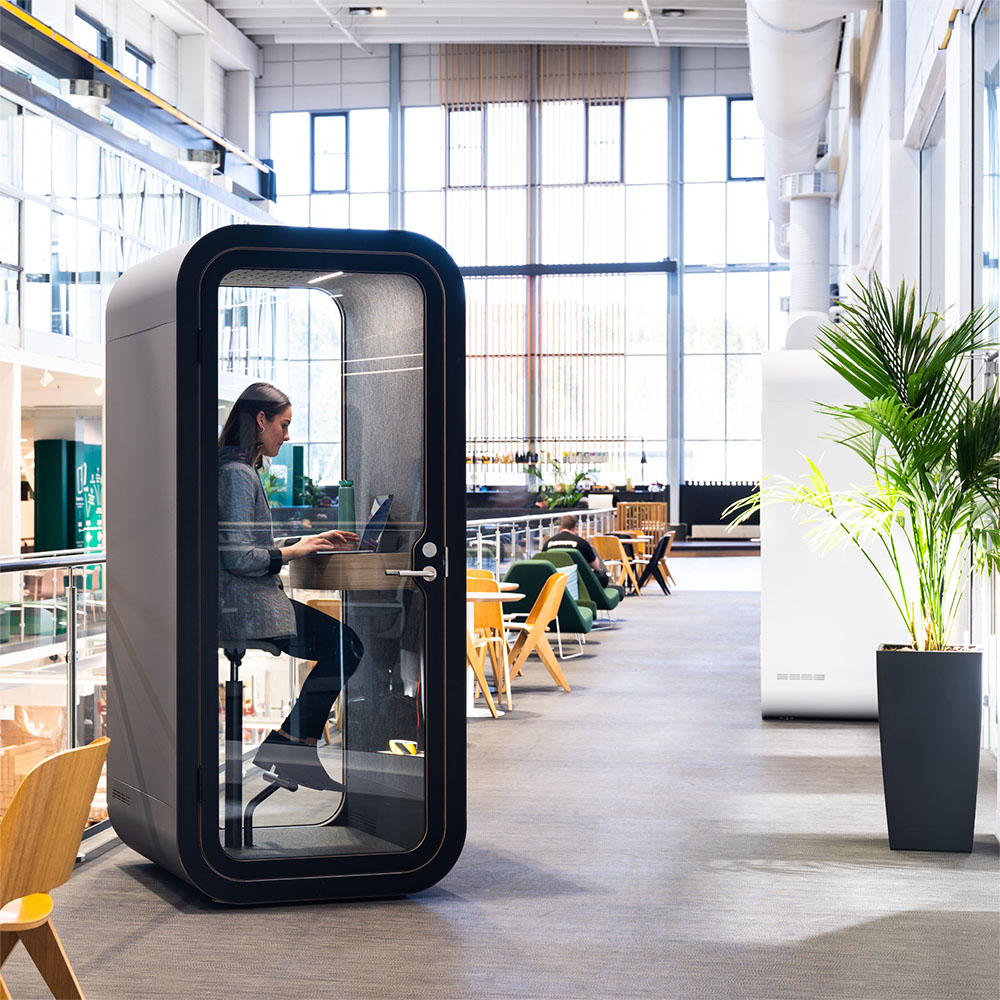
What affects a company’s carbon footprint?
One way to track the greenhouse gas emissions (GHG) throughout the whole value chain is to divide it across three scopes 1, 2, and 3. Scope 1 of GHG refers to direct energy consumption within the organization. Scope 2 includes indirect emissions that are caused by the production of electricity, heating, and cooling used by the organization. Scope 3 refers to all indirect emissions that occur in the value chain of the organization, such as emissions of the organization’s suppliers and customers.
At Framery, we are committed to reducing our greenhouse gas emissions aligned with the 1.5C temperature goal of the Paris Agreement. Our target is validated by the Science Based Targets initiative.
In addition, our office and production facilities run on 100% renewable electricity. For instance, we have switched to biogas-run trucks and renewable diesel as part of our logistics. The Framery office pods and booths have also been designed to enable companies to run their offices in a more efficient and sustainable way. The annual fossil carbon footprint of the Framery O pod is approximately 1,640 kgCO2e over its 10 years lifetime. As a comparison, this is less than one person’s flight from Helsinki to New York.
What is circular economy?
With limited material resources at our disposal on this planet, we all need to move from a linear take-make-waste economy towards a circular way of thinking. Circular economy aims to eliminate waste and pollution, circulate products and materials, and regenerate nature to combat climate change as well as the unsustainable production practices and use of resources.
To adopt a circular way of thinking, the products must be designed for a circular economy. This begins at the level of design where focus is brought to maximizing the lifetime and eliminating the creation of waste and pollution at every step in the process. Another central principle of circular economy is that it allows nature to regenerate. Otherwise, we run the risk of extracting resources from nature without allowing it to recover.
At Framery we are making our products fit the circular economy. The modular design of the products enables refurbishing them for extended lifetime. Framery Subscribed is our take on the circular economy business model. With the help of our digital services, use of both the pod and office space can be optimized.
In 2021 we also launched our forward-thinking new Framery One office pod that was designed with a circular economy philosophy. Framery One’s modular design enables upgrading the pod and extending its life, while the pod’s materials are recycled and reused for closed loop material circulation. Rather than dispose of parts and materials after the pod comes to the end of its life, they can be repurposed and repaired, allowing for long-term value retention.
95% of Framery One’s materials can be recycled and the pod is designed to be as easy as possible to update. Thanks to its superior durability and upgradeability, the lifespan of a Framery One office pod is up to 50 years, making it the most sustainable pod in the world.
In certain markets, our office pods can be used for a monthly fee with Framery Subscribed, our product as a service that helps to maximize the pod’s lifetime. In addition to promoting a circular economy, the Subscribed model comes with a lifetime guarantee, relocation services, and an on-demand maintenance service for the pods. With the Subscribed model, Framery pods can serve multiple lifetimes and many different users. Instead of having to produce brand-new products, Framery pods can be refurbished and upgraded to extend their time in active use. Read more about Framery Subscribed.
Framery supports sustainable practices at the office
A sustainable office takes into account its environmental impact and aims to create an healthy environment to work in. However, this is only one part of true sustainability. At Framery, we have divided our sustainability efforts into three categories.
- Climate and environment. Resource scarcity, climate change, and loss of biodiversity are real existential threats to the entire planet. That is why we are dedicated to making our business models circular. This helps us future-proof our business while respecting the boundaries of our planet, and developing products that help offices around the world to do the same.
- People and society. At Framery we want to empower all our people and cherish the relationships made with our customers and everyone we work with.
- Fair business. Playing by the rules and running our business in a sustainable manner is our key to success. Our sustainable business operations have made Framery the pioneer and global market leader in soundproof office pods and booths.
Read more about sustainability at Framery and download our most recent Sustainability report.

